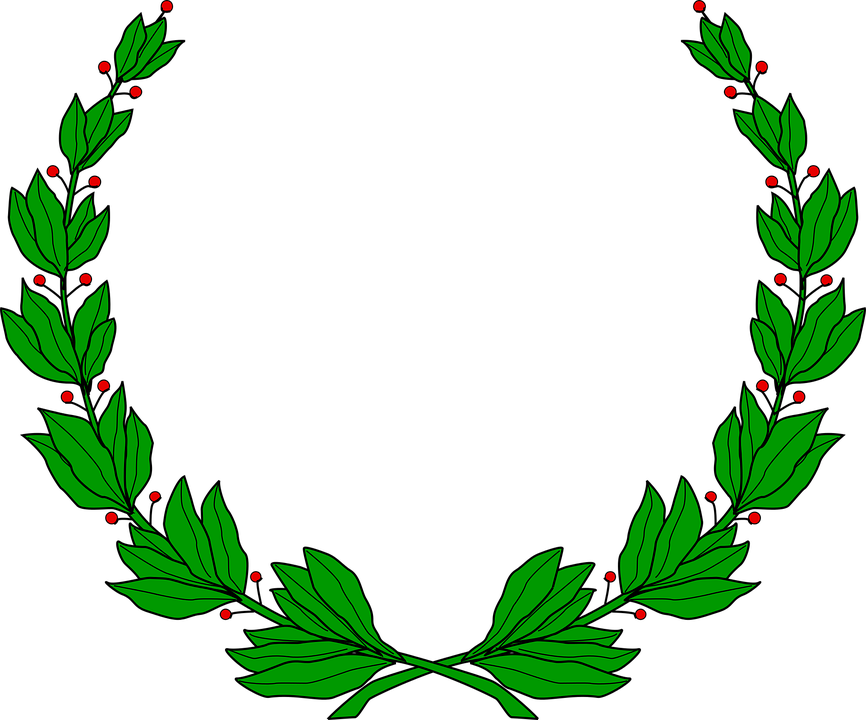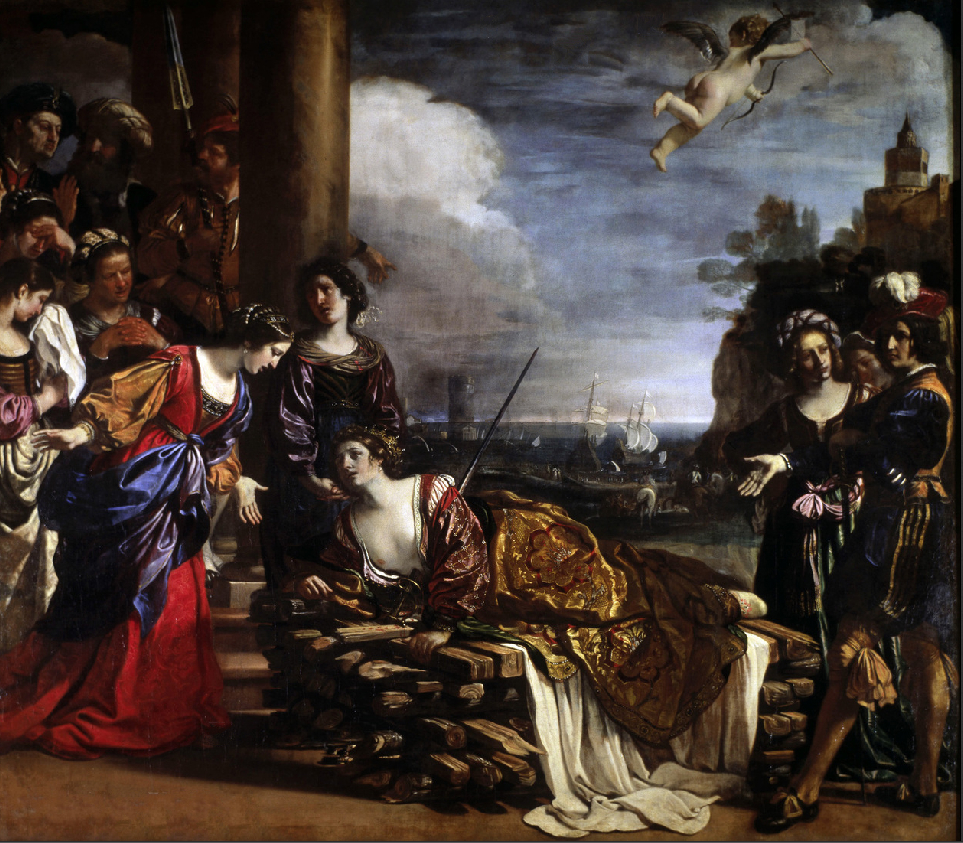(十三)告诉劳拉我爱她
月桂还是理想花园中的常见元素。
古罗马抒情诗人和小说家盖厄斯·阿尔比特(Gaius Petronius Arbiter,27年-66年)的讽刺小说《爱情神话》(Satyricon)第139卷第8章有一段:
“她急切地将我引向后者,把我带到一个可爱的角落,大自然赋予了它所有令人愉悦的事物。
顶部被修剪过的松树摇曳着
撒下夏日阴凉
还有婆娑的柏树和庄严的悬铃木
以及结着浆果的月桂树。一条小溪微波荡漾
溅起泡沫,忽又跳起舞蹈
淙淙流水挟着鹅卵石前行。
这是爱情的角落,
林中夜莺和城里的燕子
来见证;盘旋在油亮亮的
草地上
还有嫩紫香堇;用歌声讨好,它们被偷走的爱”。
(She hastily conducted me straight to the latter, introducing me into a lovely nook that nature had furnished with everything that could delight the eye.
Shorn of its top, the swaying pine here casts a
summer shade
And quivering cypress, and the stately plane
And berry-laden laurel. A brook's wimpling waters strayed
Lashed into foam, but dancing on again
And rolling pebbles in their chattering flow.
It was Love's own nook,
As forest nightingale and urban Procne undertook
To bear true witness ; hovering, the gleaming grass
Above
And tender violets; wooing with song, their stolen love.)
甚至有时月桂会出现在葬礼中,让人回想起死者生前的荣耀。在古代,月桂和橄榄树是最富象征意义的树木。
西班牙6世纪末7世纪初的教会圣人和神学家圣依西多禄( San Isidoro de Sevilla, 560年-636年)在他的类百科全书 《词源》(Etymologies)对 “Laurel”一词作了注解:
“ laurel”(Laurus)一词源于laudis(赞美)。胜利者的头上佩戴桂冠以示赞美。古人称为“laudea”。而后,单词中的字母D被R代替,它被称为laurus,就像auriculis(耳)起初拼读为audiculae,medidies(中午)如今拼读成meridies一样。希腊人称这棵树为δ?φνη(Dafne)δαφνην,因为它永远不会失去鲜绿的颜色。因此,获胜者佩戴它的花冠。老百姓们认为这是唯一不能被雷击倒的树”。
("Laurel" (Laurus) is so called from the word laudis (praise). The heads of the victors were crowned with praise with this tree. Among the ancients it was called laudea; then the letter D was abolished and replaced by R and it was called laurus, just like auriculis (ears) which was at first pronounced audiculae and medidies (midday) which is now pronounced meridies. The Greeks call this tree δ?φνη (Dafne) δαφνην because it never loses its verdure; and for this reason the winners are crowned with him. The common people believe that this is the only tree that can not be struck by lightning.)

月桂树象征着艺术和军事上的胜利,这个含义在整个中世纪都得到了保留,尤其在文艺复兴时期,月桂又象征着爱情的胜利。
文艺复兴时期与薄迦丘、但丁齐名的意大利桂冠诗人弗朗切斯科·彼特拉克(Francesco Petrarca,1304年-1374年)年轻时曾经遇到一个名叫劳拉(Laura)的女人,Laura 是月桂(Laurus)的女性化形式。这个女人的出现让彼特拉克产生了不可言传的愉悦,激发了他的创作激情。诗人把她理想化了,沉浸在不求回报的精神爱恋中。他们甚至可能没有约会过,诗人把全部的情感倾注在诗作中,这些爱情诗被收集在《歌集》(Songbook)中。《歌集》共收入抒情诗366首,除30余首外,其余的诗全都是表现诗人对劳拉爱情的作品。
既然这个令诗人日夜思慕的女人叫“月桂”,他的诗行里怎可缺了这种纯洁可爱的树?现选出两首,翻译如下:
《歌集》第29首:
绿色的长裙,淑女们从未穿过
深红,黑或紫色的衣服,
也未把金发扎成漂亮的辫子,
丽人如她掠劫了
我的意志,带走
我的自由之路,我甚至无法忍受
较轻的束缚。
(Green dresses, crimson, black or purple,
were never worn by ladies,
nor golden hair tied in a fair braid,
as beautifully as she who robs me
of my will, and takes away the path
of my liberty, so I cannot even
tolerate a lighter yoke.)
即使我开始黯然神伤
失去了判断
当痛苦带来困惑
一见到,那个消除了我心中
每个疯狂念头,将所有的蔑视
化成甜蜜的她,我松散的意志
很快复原
(And even if my spirit begins to grieve,
losing its judgement,
when suffering brings doubt,
the loose will is quickly restrained
by the sight of her, who razes from my heart
every mad project, and makes all
disdain sweet through seeing her. )
我将报复,所有因爱而生
的痛苦,煎熬不断
直到她治愈了那颗被她亲手重创的心
她,不懂怜悯,却依然诱人,
除非愤怒和骄傲反抗着谦卑
关闭和否定了
走向她的路。
(I will have revenge, for all that Love
has made me suffer, all I must still suffer
until she heals the heart she ravaged,
she, alien to pity, but still enticing,
unless Anger and Pride opposing Humility
close off and deny the way
that leads to her.)
那日子那时辰我睁开双眼
看到的美好之黑夜和白天
将爱清空使我茫然
恰是我生活的新烦恼根,
她如我们这个年代反映的那样
根本不惧怕
由铅或石做成的他
(And the day and the hour that opened my eyes
to the lovely dark and the lovely white
that emptied me of that where Love now lives,
were the new roots of the life that troubles me,
as she does in whom our age is reflected,
for he is made of lead or stone
whom she does not make afraid.)
所以我哭泣的人并没有流泪
因为这些沐浴我心,
最先在血液里,感受到的,箭头
表示我放弃了希望,
惩罚落在了正确之地:
穿过眼睛我的灵魂在叹息,这是对的
它们在为我洗伤。
(So no tear of those I weep,
because of these arrow-tips
bathing my heart, that first felt them, in blood,
signifies that I un-wish what I wished,
the punishment falls in the right place:
through the eyes my soul sighs, and it's right
that they bathe my wounds.)
我与自己的想法抗争着:
所以狄多,和我一样的筋疲力尽,
把她心爱的剑对准她自己:
但我不祈求自己获得自由,
因为通往天堂的道路全都不那么真实,
找不到更安全的船只
去往那荣耀之国
(My own thoughts struggle against me:
so Dido, weary as I am now,
turned her beloved sword against herself:
yet I do not pray for my freedom,
since all other roads to heaven are less true,
and there is no safer ship in which to aspire
to the glorious kingdom.)
善良的星星是旧友朋
来到那个幸运的子宫
美丽降临凡间!
她是地球上的一颗星,贞洁
如常青的月桂树,
闪电击不垮,邪恶的微风
也无法强迫她
(Benign stars that were friends
to that fortunate womb
when that beauty came to this world!
She is a star on earth, and she keeps
her chastity as laurel stays green,
so no lightning strikes her, no shameful breeze
can ever force her.)
我深知对她的赞美若写成诗
将超过
世间最有价值的作品。
哪个记忆细胞可以容纳
如此多的美德和美貌
一并在她的眼中闪耀,无价之象征,
打开我心灵的钥匙。
(I know that to capture her praise in verse
would be to exceed
the most worthy that set hand to writing.
What cell of memory is there in which to hold
so much virtue and so much beauty together
that shine in her eyes, the sign of all value,
the key to unlock my heart.)
淑女,在太阳的光圈下,爱
因你而价值非凡。
(Lady, beneath the sun's circle, Love has
no greater treasure than you.)
这首诗反映的是诗人一厢情愿的思恋。劳拉是降临凡间的星星,如美丽贞洁的月桂,一身绿裙,不穿其他颜色的衣服,飘逸的金发如繁茂的月桂枝叶。一见到她,诗人的心就被爱神之箭射中了。
可她人如其名(月桂最早的名字是达芙妮),有着闪电也不能击毁的坚强的意志,不可能接受阿波罗疯狂的爱,所以如今的劳拉也不懂得怜悯诗人的痛苦和悲伤。穿透心灵的爱神之箭成为鲜血淋漓的惩罚,令绝望的诗人痛苦不堪。他甚至想到迦太基女王狄多(Dido)也爱得同样的筋疲力尽,最后将心爱的剑对准了自己的胸膛。狄多是维吉尔的《埃涅阿斯纪》中的人物,她是北非海岸城市迦太基(Carthage)的女王。她在建造新城的时候,恰巧埃涅阿斯的船队遇到海难,漂到了迦太基附近的海岸上。女王收留了他们,深深爱上了埃涅阿斯,两人以夫妻身份生活在一起,埃涅阿斯开始表现得好像他是迦太基的国王。朱庇特派出使者告诉埃涅阿斯:他不能留在迦太基,他的命运是为特洛伊人在意大利找到一个新的城市。当狄多听说埃涅阿斯打算离开时,感到十分震惊,她始终以为他俩最终会结婚。但埃涅阿斯坚持认为自己别无选择,只能服从诸神。不久他和部下前往意大利,狄多看到船只驶向大海,下令建造葬礼柴堆。她爬了上去,诅咒埃涅阿斯,并用他给她的剑刺死了自己。
(埃涅阿斯向迪多诉说自己的经历)

(迪多之死)

尽管引用了狄多的故事,但诗人似乎并不赞同埃涅阿斯听从诸神的建议去追求所谓的自由。因为“通往天堂的道路全都不那么真实”,茫茫大海暗藏着无数凶险,“找不到更安全的船只,去往那荣耀之国”。为什么不留下来,与心爱的女人厮守一生呢?
可是最后,尽管心碎了一地,诗人仍以世间最优美的诗句赞美劳拉,就如太阳之神阿波罗会继续爱着变成了月桂的达芙妮一样。“在太阳的光圈下,爱/ 因你而价值非凡。”




